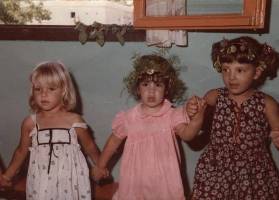Loving Kindness … and Cheesecake
Permanent link All Posts

An Israeli-style Shavuot party at Galit's (center) kindergarten
Unlike most Jewish holidays with their “must do or not do” restrictions, and themes of being hated, slaughtered or narrowly escaping, Shavuot has some bright features: It's the day that the Torah was given to us, it marks the beginning of the summer, it’s an agricultural holiday that celebrates the harvest—we get to eat delicious dairy food and indulge ourselves with cheesecakes and quiches. And, with the beautiful story of Megilat Ruth (Ruth’s scroll) setting the theme of loving kindness, it’s a pretty great holiday.
When I lived in Israel, Shavuot was always one of my favorite holidays. Growing up in an Orthodox family, my dad used to go to shul after dinner and return at 6 a.m. after studying all night with his friends as part of the "Tikun Leyl Shavuot" custom.
When I got older, I wanted to be a part of those all-night study sessions. In Tel Aviv, I found Alma, an alternative center for Hebrew Culture. My studies there offered me a variety of classes and different interpretations to the classic traditional studies. Going there on Shavuot night became a habit for me and my friends, and it also seemed to represent a shift in the city, which is mostly secular.
Now living in Chicago, I wonder why Shavuot has been relegated to redheaded stepchild status, its importance falling behind Chanukah and the High Holidays and Sukkot in many Jewish communities. Maybe its primary message about the covenant at Sinai is too scholarly. Maybe its secondary message is less relevant to the daily lives of Jews here—how many among us are farmers? Maybe modern American Jews don’t have enough in them to celebrate two harvest-themed holidays and the excitement of building a hut trumps Shavout. Or, in my opinion, maybe we all need a reminder of the story of Ruth to see where one measure of the holiday’s beauty lies.
I spoke with Rabbi Asher Lopatin from the Modern Orthodox congregation Anshe Sholom B'nai Israel in Lakeview to find out why he thinks Shavuot is so un-hyped—and to talk about the holiday’s relevance for modern American Jews. He agreed that the farming aspect might be an obstacle.
“The holiday focuses on agriculture in Israel which is the same idea as Sukkot and frankly is also not popular,” he says. “(Historically,) Shavuot is the harvest time, so here it’s more challenging for us. We are not farmers,” he says.
But, he says, as Jewish traditions grow in the U.S., there might be a resurgence of interest in the holiday. “In the last 10-20 years all of the movements (including Reform and Conservative) started talking [more] about Torah and Sinai, about learning Torah; and there is more interest in all the movements in Torah and in Tikun Leyl Shavuot. So there is growing interest in the holiday”.
There is also interest in the issue of conversion—a hot topic among many Jews living in Chicago and the U.S. In short, the story of Ruth is a conversion story—one of love and acceptance that remains relevant today.
During the time of the harvest in Bethlehem, there was a famine. The family of Elimelech, the Prince of Judah, decided to move to Moab and, not long after the move, the sons met two Moabite women—Ruth and Orpah—and married them. When tragedy struck and the men of the family died, Naomi, the matriarch, told her daughters-in-law to return to their families and remarry. Orpah did but Ruth insisted to Naomi: " Where you go I will go, and where you stay, I will stay. Your people will be my people and your God my God." Since that day, Ruth has been considered to be Jewish. She met Boaz, married him and their great grandchild was King David.
I couldn't help wondering what would happen to Ruth today. Those few sentences sound so simple compared to today’s conversions. I asked the rabbi if Ruth’s quick and easy conversion would fly in today’s Jewish world.
“When Ruth said, ‘Your people will be my people,’ she was accepting Mitzvot and the destiny of the Jewish people,” says Rabbi Lopatin. “Ruth had every reason not to convert, Judaism was not a popular religion. Today, we are more reluctant [in general] and hesitate when things are good. Conversion could take today a few minutes today too, but we need to know that people are committed.”
The main message from Megilat Ruth, Rabbi Lopatin says, is courage and chesed, loving kindness. Even though we love big dramas and heroic tales like those of Exodus and Purim, maybe we should celebrate the “simple” but profound story about chesed, loyalty and devotion.



.jpg)



